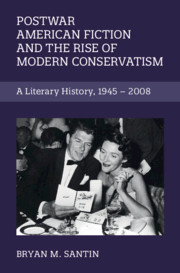Book contents
- Postwar American Fiction and the Rise of Modern Conservatism
- Cambridge Studies in American Literature and Culture
- Postwar American Fiction and the Rise of Modern Conservatism
- Copyright page
- Dedication
- Contents
- Acknowledgments
- Introduction
- Chapter 1 US Literature and the Modern Right at Midcentury
- Chapter 2 The Conservative Movement’s Foundational Fictions
- Chapter 3 The Strongbox of Custom
- Chapter 4 Movement Conservatism, Neoconservatism, and the New Right
- Chapter 5 The American Novel and the Reagan Revolution
- Epilogue: The Curious (Conservative) Case of Marilynne Robinson
- Notes
- Bibliography
- Index
- Cambridge Studies in American Literature and Culture
Chapter 5 - The American Novel and the Reagan Revolution
The Ascent of Toni Morrison in the Age of Conservative Pop Fiction, 1987–2000
Published online by Cambridge University Press: 27 March 2021
- Postwar American Fiction and the Rise of Modern Conservatism
- Cambridge Studies in American Literature and Culture
- Postwar American Fiction and the Rise of Modern Conservatism
- Copyright page
- Dedication
- Contents
- Acknowledgments
- Introduction
- Chapter 1 US Literature and the Modern Right at Midcentury
- Chapter 2 The Conservative Movement’s Foundational Fictions
- Chapter 3 The Strongbox of Custom
- Chapter 4 Movement Conservatism, Neoconservatism, and the New Right
- Chapter 5 The American Novel and the Reagan Revolution
- Epilogue: The Curious (Conservative) Case of Marilynne Robinson
- Notes
- Bibliography
- Index
- Cambridge Studies in American Literature and Culture
Summary
This chapter interrogates the conservative conceptualization of great literature during the culture wars, arguing that it was an over-determined symptom revealing how two different discourses of literary prestige clashed in a futile attempt to reconcile the radical tension between capitalism and traditionalism. This debate turned the category of “highbrow fiction” into a condensation point of perplexing opposites, combining disparate conservative explanations for social decline. For Reagan era conservatives, highbrow fiction was somehow both an elitist liberal discourse that betrayed traditional American values and a great civilizational barricade against the untutored, racialized masses. Ultimately, conservatives mourned the deterioration of meaningful connection and community produced by capitalism, but they reconfigured this neoliberal nihilism into a left-wing specter that haunted contemporary American fiction and the institutions of higher education that produced and legitimized it. The conservative movement’s simultaneous suspicion of contemporary literary prestige and their embrace of popular realist fiction were rooted in a commitment to market-based individualism, nominal colorblindness, and the aestheticization of populist white grievance. This chapter probes these ostensible contradictions to illuminate how Toni Morrison and Tom Wolfe emerged as major, diametrically opposed figures in the cultural politics of American fiction toward the end of the twentieth century.
Keywords
- Type
- Chapter
- Information
- Postwar American Fiction and the Rise of Modern ConservatismA Literary History, 1945–2008, pp. 199 - 239Publisher: Cambridge University PressPrint publication year: 2021

